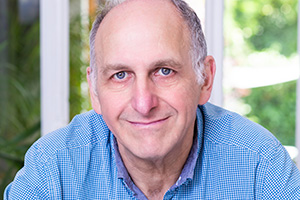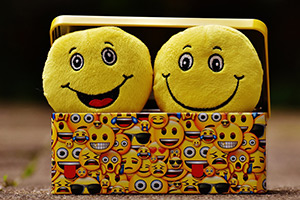What is a joke?
This year's Big Comedy Conference will be combining talks and star interviews with a number of practical sessions, including one on how to write jokes. 'But what is a joke?' asks Dave Cohen. Spoiler alert: The answer is informative but not very funny.
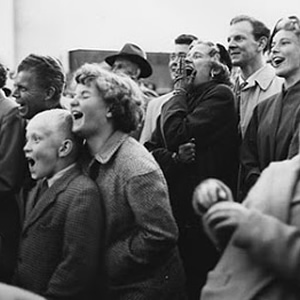
Jokes. Jokes jokes jokes jokes jokes. It's pretty obvious isn't it, if you want to write comedy you have to be able to write jokes. That's most of what you should be writing, most of the time. If you're writing stand-up comedy, or topical gags, and the sentence you've just written isn't funny, then either the next sentence has to be funny or you'll have to cut them both.
It's amazing how often writers forget to write jokes. Even the most experienced professionals - maybe swept up with the excitement of communicating their great new idea, or absorbed by the story they want to tell - sometimes forget that they are being paid to write comedy. And comedy means that people should be laughing nearly all the time, and when they're not laughing it's because they're listening to the set-up for the next laugh.
Entire scripts are developed, through several drafts, overseen by producers and TV commissioners and even made into full programmes before everyone realises that one of the main problems with the show is there aren't enough jokes.
I'm not making a qualitative judgement here, but a quantitative one. The jokes I like may not be the ones you do, but there should be lots and lots of them. If you're writing a scene and struggling to find a way to fit some jokes around your narrative or characters, then there's something wrong in that scene with your narrative or characters. The solution will hardly ever involve sacrificing jokes.
And if you're writing a show that you're not expecting to be filmed in front of an audience, that makes no difference. Shows like Bluestone 42, Bad Education and Uncle are as packed full of jokes as any number of audience sitcoms.
Why does so much TV comedy fail to live up to our expectations? Or, if it's something you've written, why does the show you're watching on the screen look inferior to the one you were carrying for months in your head? The answer is partly that it's not always clear to a writer or performer what the best joke is.
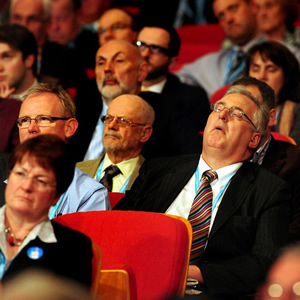
The commonest mistake made by beginner stand-ups is to be thrown when the audience fails to laugh at their new jokes. The performer delivers what they think is a funny line, and the audience doesn't laugh.
The audience aren't judging you, as far as they know you're still building up to the joke. The performer however is thinking: 'They didn't laugh at that line! That's my favourite joke. They hate me.' Their demeanour on stage starts to reflect this, now the audience see the look of panic and start to lose confidence in the performer. So it becomes a self-fulfilling prophecy, all because the performer didn't have the experience to ride through the lack of laughs and move on as if nothing untoward had happened.
An experienced performer will try the joke again at other gigs, maybe tweak it, adding a word or sentence here, moving it around, put it in a different place in a routine - either find a way to make it work or, finally, ditch it.
One of the great problems with jokes is that you never know if they're going to work until you try them out on someone. That's why so many comedy writers work in pairs - if you can make the person sitting next to you laugh, then at least one person aside from you has found it funny.
Every professional writer has a list of jokes they loved that never made it into the final script. Or failed to get a laugh on the night: American comedy writers even have a lovely name for this - 'the restaurant on the corner.' It can't possibly fail, it's approachable from two different roads, it has potential to attract double the number of customers - but check your local high street, that restaurant on the corner is always the first business to close down. Then again, you may have dashed off a few lines without thinking, that get the biggest laughs of the episode. As American sitcom writer Fred Barron said, "Life isn't always fair, but sometimes it's unfair in your favour."
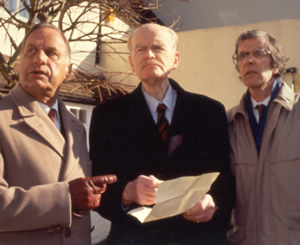
'Slippery customers, jokes', as Jimmy might have said in Reggie Perrin. About two thirds of the way into writing this article, I began to do some research to check if I'd missed anything. What I found was that there's hardly anything written anywhere defining jokes. Sally Holloway has written a great manual for comedy writers, The Serious Guide To Joke Writing, and there's plenty of scientific and psychological analysis of why we laugh, including The Naked Jape by Lucy Greeves and Jimmy Carr, whose thoughtful narrative is nicely punctuated by hundreds of gags. But there are hardly any specific definitions of jokes.
One of the few items on the internet refers to 'mathematical jokes' as a new category. I'd say that's a little niche, but music and mathematics are closely related to joke creation. A joke is like an equation, but instead of saying 2 + 2 = 4; it's 2 + 2 + (x) = 5, where x is the 'x factor', the comic twist that surprises us and makes two and two add up to five.
And the rhythm of poetry and music beats through the heart of all great comedy. Seinfeld is the best example of this, where many new scenes open with a précis of the last scene and it sounds like they're singing.
What is a joke? A joke is a three act story. All stories have three acts, you know this because you've read The Poetics by Aristotle, I hope, still the best book ever written about writing. Aristotle was the first person to recognise that every story has a beginning, a middle and an end. And between each of those sections there's a defining moment that twists the story round. Aristotle calls them complications, Robert McKee 'the inciting incident'. You can read The Poetics online and it's really short, 400 plus pages shorter than McKee's Story and £25 cheaper.
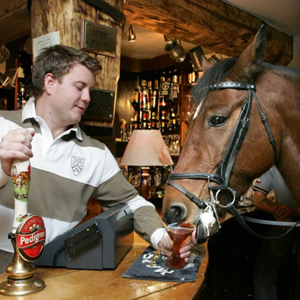
In a movie, act one is usually the opening ten minutes, then the twist into act two brings about an hour or so of complications, until the next big twist takes us to the end, which lasts around 15 minutes. That's around 90-120 minutes. A joke, well written, lasts about ten seconds, but the same rules apply.
With a joke, act one is our real world, a nice normal place to leap from, then something unusual happens, and there's a complication (act two), then there's another twist, which propels us straight to the punchline. So in act one a bloke walks into a bar, because that's normal, but he's wearing a suit made of bread and a tomato on his head, which you will admit is unusual. The barman asks him to leave, which is our act two complication, and when the bloke asks why he is given the twist and the punchline at the same time, which is 'we don't serve sandwiches.'
On Saturday 29 November you'll get a chance to work with some of our top gag writers to make your jokes work. And there'll be a panel devoted to writing jokes for specific radio shows. So start writing now.
In part two I shall try to define every type of joke. Yes - EVERY one.
See also: What is a joke? - Part 2
This article is provided for free as part of BCG Pro.
Subscribe now for exclusive features, insight, learning materials, opportunities and other services for comedy creators.

